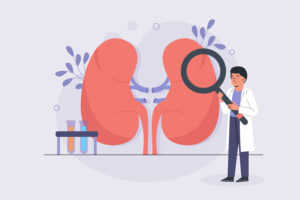Kidney health is often overlooked when it comes to children’s well-being, but it is just as important as any other aspect of their health. In fact, pediatric kidney conditions are more common than you might think. Recognizing the signs and symptoms early on can make a significant difference in treatment outcomes.
In this article, we will dive into the world of pediatric kidney conditions, exploring common issues, symptoms, and treatment options. Whether it’s a urinary tract infection, kidney stones, or even more severe conditions like pediatric nephrotic syndrome or chronic kidney disease, understanding the importance of early detection and appropriate treatment is crucial for ensuring the long-term health and wellness of children.
Common Kidney Conditions in Children
Kidney conditions can affect children of all ages, from infants to teenagers. Understanding the common kidney conditions that can arise in children is the first step in recognizing and addressing them effectively.

1. Urinary Tract Infections (UTIs):
Urinary tract infections are one of the most common kidney conditions in children. They occur when bacteria enter the urethra and travel up to the bladder and kidneys. UTIs can cause discomfort and may lead to more severe complications if left untreated.
2. Kidney Stones:
Kidney stones are hard deposits that form in the kidneys. While they are more commonly seen in adults, children can also develop kidney stones. These stones can cause pain and discomfort, and may require medical intervention for removal.
3. Pediatric Nephrotic Syndrome:
Pediatric nephrotic syndrome is a condition that affects the kidneys’ ability to properly filter waste and excess fluid from the blood. It is characterized by symptoms such as swelling, proteinuria (excessive protein in urine), and high cholesterol levels.
4. Chronic Kidney Disease (CKD):
Chronic kidney disease is a long-term condition where the kidneys gradually lose their ability to function properly. It can be caused by various factors, including congenital abnormalities, kidney infections, and certain medications. Early detection and management of CKD are essential to prevent further damage to the kidneys.
Causes and Risk Factors of Pediatric Kidney Conditions
Several factors can contribute to the development of kidney conditions in children. Understanding these causes and risk factors can help parents and caregivers take proactive steps to minimize the risk.

1. Genetic Factors:
Some kidney conditions, such as polycystic kidney disease, are hereditary. If a child has a family history of kidney disease, they may be more susceptible to developing similar conditions.
2. Infections:
Infections, particularly urinary tract infections, can increase the risk of kidney conditions in children. Prompt treatment of infections and practicing good hygiene can help reduce the risk of complications.
3. Structural Abnormalities:
Children with structural abnormalities in their kidneys or urinary tract are more prone to kidney conditions. These abnormalities can be present at birth or develop later in life.
4. Medications and Toxins:
Certain medications and toxins can have a detrimental effect on kidney health, especially if used or exposed to in excessive amounts. It is important to follow proper dosage guidelines and avoid exposure to harmful substances.
5. Other Medical Conditions:
Certain medical conditions, such as diabetes or hypertension, can increase the risk of kidney disease in children. Managing these conditions effectively can help minimize the impact on kidney health.
Signs and Symptoms of Pediatric Kidney Conditions
Recognizing the signs and symptoms of kidney conditions in children is crucial for early detection and intervention. While the symptoms may vary depending on the specific condition, there are some common signs to be aware of.
1. Frequent Urination:
Children with kidney conditions may experience frequent urination, often accompanied by pain or discomfort.
2. Blood in Urine:
The presence of blood in the urine, known as hematuria, can indicate a kidney condition. It may appear pink, red, or brown in color.
3. Swelling:
Swelling, particularly in the legs, ankles, and face, can be a sign of kidney problems. This occurs due to the kidneys’ inability to properly regulate fluid balance.
4. Fatigue and Weakness:
Children with kidney conditions may feel tired and weak due to the buildup of waste products in the body.
5. Delayed Growth and Development:
In some cases, kidney conditions can affect a child’s growth and development. This may manifest as a delay in physical growth or cognitive development.
Diagnosis and Testing for Pediatric Kidney Conditions
Diagnosing kidney conditions in children often involves a combination of medical history evaluation, physical examination, and diagnostic tests. Early detection and accurate diagnosis are essential for determining the most appropriate treatment plan.

1. Medical History and Physical Examination:
The healthcare provider will review the child’s medical history and conduct a physical examination to assess for any signs or symptoms of kidney conditions. They may ask questions about the child’s urinary habits, overall health, and family history.
2. Urine and Blood Tests:
Urine and blood tests are commonly used to evaluate kidney function. These tests can detect the presence of abnormalities, such as proteinuria, hematuria, or elevated creatinine levels.
3. Imaging Tests:
Imaging tests, such as ultrasound, CT scan, or MRI, may be performed to visualize the kidneys and identify any structural abnormalities or stones.
4. Kidney Biopsy:
In some cases, a kidney biopsy may be necessary to obtain a small sample of kidney tissue for further analysis. This procedure is usually performed under local anesthesia and helps determine the underlying cause of the kidney condition.
Treatment Options for Pediatric Kidney Conditions
The treatment approach for pediatric kidney conditions depends on the specific condition, its severity, and the child’s overall health. The goal is to manage symptoms, slow down disease progression, and preserve kidney function.
1. Medications:
Medications are often prescribed to manage symptoms and underlying causes of kidney conditions. This may include antibiotics for UTIs, diuretics to reduce swelling, or immunosuppressants for conditions like nephrotic syndrome.
2. Dietary Modifications:
In some cases, dietary modifications may be recommended to help manage kidney conditions. This may involve reducing sodium intake, limiting protein consumption, or increasing fluid intake.
3. Surgical Intervention:
Surgical intervention may be necessary for certain kidney conditions, such as kidney stone removal or correction of structural abnormalities.
4. Dialysis and Transplantation:
In severe cases where kidney function is significantly impaired, dialysis or kidney transplantation may be required. These options provide artificial kidney function or replace the damaged kidneys with a healthy donor organ.
Lifestyle Changes for Promoting Kidney Health in Children
In addition to medical treatment, certain lifestyle changes can significantly contribute to promoting kidney health in children.

1. Balanced Diet:
Encouraging a balanced diet that includes a variety of fruits, vegetables, whole grains, and lean proteins can provide essential nutrients for kidney health. Limiting processed foods and excess salt intake is also beneficial.
2. Hydration:
Staying hydrated is vital for maintaining optimal kidney function. Encourage children to drink an adequate amount of water throughout the day and limit sugary beverages.
3. Good Hygiene Practices:
Practicing good hygiene, such as regular handwashing and proper genital area care, can help prevent urinary tract infections and reduce the risk of kidney conditions.
4. Regular Physical Activity:
Engaging in regular physical activity promotes overall health and can help prevent conditions such as obesity and hypertension, which can negatively impact kidney health.
Preventive Measures for Pediatric Kidney Conditions
Prevention plays a crucial role in safeguarding children’s kidney health. Implementing the following preventive measures can significantly reduce the risk of kidney conditions.
1. Immunizations:
Ensuring that children receive recommended immunizations can help prevent infections that can lead to kidney conditions.
2. Good Hygiene Education:
Teaching children about the importance of good hygiene practices, such as proper handwashing and personal care, can reduce the risk of urinary tract infections.
3. Adequate Fluid Intake:
Encouraging children to drink an adequate amount of water and other healthy fluids can help prevent dehydration and promote kidney health.
4. Regular Check-ups:
Regular check-ups with a healthcare provider allow for early detection of any potential kidney issues and provide an opportunity for timely intervention.
Support and Resources for Families Dealing with Pediatric Kidney Conditions
Dealing with pediatric kidney conditions can be challenging for families. Fortunately, there are support networks and resources available to help navigate this journey.

1. Pediatric Nephrologists:
Pediatric nephrologists are medical specialists who diagnose and treat kidney conditions in children. They can provide expert guidance and support throughout the treatment process.
2. Support Groups:
Joining support groups or online communities can connect families with others who are going through similar experiences. Sharing stories, advice, and support can make a significant difference.
3. Educational Materials and Websites:
Numerous educational materials and websites provide valuable information on pediatric kidney conditions. These resources can help families better understand their child’s condition and treatment options.
4. Counseling and Mental Health Support:
Dealing with a chronic illness can take a toll on the mental health of both children and parents. Seeking counseling or mental health support can provide much-needed emotional support and coping strategies.
Conclusion
Kidney health in children should never be overlooked. Recognizing the signs and symptoms of pediatric kidney conditions early on is crucial for timely intervention and better treatment outcomes. Through early detection, appropriate diagnosis, and effective treatment, children with kidney conditions can lead healthy and fulfilling lives.
In addition to medical intervention, promoting kidney health in children involves adopting a balanced diet, staying hydrated, practicing good hygiene, and incorporating regular physical activity. Preventive measures, such as immunizations and regular check-ups, further contribute to safeguarding children’s kidney health.


